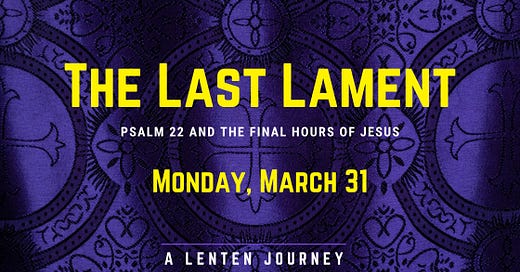Update for Paid Subscribers:
My day-by-day writing for “The Last Lament” has been deeply powerful for me. Your support and encouraging comments recently have been very helpful—and meaningful. Please continue to drop comments, questions, or responses in the comment section.
And for those who have written me personally, I have read every one of your emails and I thank my God for you and the journey you are taking this Lent.
If any reader wants to become a Paid Subscriber, please do so now. As I think our current readers would attest, it is worth it.
We have ten more days—this week and next—ending on the Friday before Psalm Sunday, April 11. And we have 15 more verses. Some days, we will need to cover more than a single verse.
Naked and Unafraid
“I can count all my bones—they stare and gloat over me; they divide my garments among them, and for my clothing they cast lots.” —Psalm 22:17–18
He was naked. Stark naked.
That detail often escapes us. In every painting, every stained-glass window, every pageant or film, Jesus is veiled in linen. Draped for modesty. Covered for our comfort.
But there was no veil on Golgotha.
The Roman soldiers did not spare His dignity. Nakedness was added as a feature to their crucifixion protocol for the sheer sport of humiliation—the body twitches and jerks in its death throes.
They stripped Him. They gambled for His garments—his robe. As they cast lots beneath the Cross, Jesus saw the fulfillment of the ancient verse: “They divide my garments among them.”
Question: Why would the psalm include such a trivial detail?
Answer: Because there is no such thing as trivial in suffering.
Sometimes, the Devil is in the details.
Not when your skin is torn.
Not when your last possession is stolen.
Not when your shame is on display.
Psalm 22 By Heart
Jesus knew Psalm 22 by heart—firmly established in His memory. He may have learned it from His parents or in the synagogue as a boy. He might have whispered it as a teen under the stars at night. Year by year, as the Lord grew older and approached the start of His ministry, undoubtedly, He saw that His future and the details of Psalm 22 would intersect.
This explains how He could forecast His ordeal on the cross years before it happened. He wasn’t prognosticating or predicting the future when He told His disciples He would die on the Cross.
He was concluding.
Rome would kill Him.
The Sanhedrin would be complicit.
Crucifixion would be the means.
And Psalm 22 was the uncanny description of the tortuous event.
Now, He sees the events of Psalm 22 playing out beneath His broken body.
“They stare and gloat.”
He is watched. Mocked. He is pierced in His hands or wrists. He sees the dice roll. He sees His robe in a soldier’s hand. He sees the fulfillment.
And yet—He speaks no curse. And He never will.
A Thought Experiment: The Robe
The soldiers toss their dice. They gamble at the foot of the condemned.
They’ve stripped Him bare.
They’re trying to turn a profit.
One of them will go home with Jesus’ robe.
Let’s pause here. Let’s do a thought experiment.
Do you know about the book The Robe—and the film that followed, starring Richard Burton? The story begins at this exact moment in Psalm 22:18: “They divide my garments among them, and for my clothing they cast lots.”
In the novel, the robe goes to a Roman tribune named Marcellus Gallio—the man who won the gamble. He carries the garment away as a spoil of execution. Just cloth, he thinks. It's just another crucifixion.
But something begins to happen to him.
The robe haunts him. It softens him. It pulls at him until he can’t escape the One who wore it. What begins as a symbol of shame becomes the thread that unravels his pride—and reweaves his soul with grace.
Here’s the question of the thought experiment: What if you had the robe?
What if you held the last thing Jesus wore before He died?
Marcellus was doing his job. His heart was cold; his hands were calloused. He was a mocker. A skeptic. A man standing close to the Cross but missing its meaning.
Until the robe found him. And then it changed him.
In my tradition—the Anglican Way—we speak of Holy Communion like this. Not with superstition. Not with magic. But with reverence. It is not a relic or a robe. It is a sacrament. Something taken directly from the life of Jesus. Something He gave to His followers then—and still gives now.
Not to mockers.
Not to gamblers.
But to the hungry. The weary. The people. His followers.
You don’t have to cast lots for it.
You just come.
You just kneel.
You just receive.
Amen.
See you tomorrow as we move toward the turning of this great psalm.
Grace and peace,
David Roseberry ☩
The Anglican
A Collect for the One Stripped for Us
O God, who in your mercy allowed your Son to be stripped of His garments, that we, clothed in shame, might be covered in righteousness: Grant us grace to see His nakedness not as defeat, but as the fullness of love poured out; that our hardened hearts may be softened, our pride unraveled, and our lives rewoven by the garment of His grace; through Jesus Christ our Lord, who was cast down that we might be raised, and now reigns with You and the Holy Spirit, one God, forever and ever. Amen.
For Paid Subscribers
I can’t cover everything in a single post, so here is more for you. More thoughts about The Robe of Christ
Keep reading with a 7-day free trial
Subscribe to The Anglican to keep reading this post and get 7 days of free access to the full post archives.





